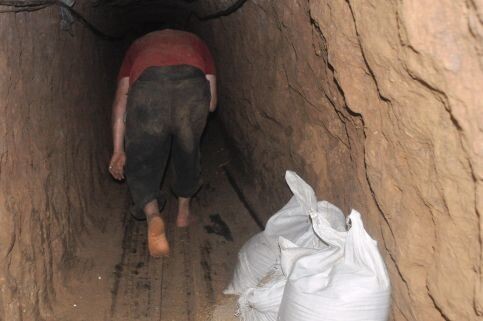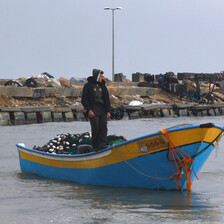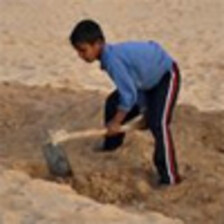The Electronic Intifada Gaza Strip 1 June 2010

At work in a tunnel (Eva Bartlett/IPS)
GAZA CITY, occupied Gaza Strip (IPS) - Life can be hard working in these tunnels, and it is always at risk. But many have no choice but to work in them, particularly since mid-2007, when Israel and Egypt, with the help of the international community, imposed a siege of staggering severity on the 1.5 million humans in the Gaza Strip.
More than 1,000 tunnels running from Egypt to Gaza employ upwards of 20,000 people, and allow in what is banned by Israel and closed borders: foodstuffs, oil, cooking gas, car parts, medicines, appliances, clothing and shoes, building materials, livestock, school materials, cola, milk formula, cigarettes — and people.
But the UN reports that since January 2008 alone, at least 135 Palestinians have been killed and over 200 injured. They have been crushed or suffocated, or they have been killed by Israeli bombings, gas poisoning by Egyptian authorities, electrocution, and fuel spills.
In August 2009, three young men from the Lahham family were killed while working in a tunnel.
Majed Lahham, 27, from Deir al-Balah, and cousins Jaber, 20, and Saber, 22, from Khan Younis were killed when Egyptian soldiers pumped poisonous gas into the tunnel they were working in, says Majed’s family. Bahari Lahham, 23, was blinded.
“Majed didn’t want to work in the tunnels,” says Mahmoud, one of his five brothers, “but he had no other options. He wanted to make an apartment on the top floor of our house, get married and start a family.”
Majed worked every day but Friday, from 5pm to 3am.
“He had quit working in tunnels, but friends persuaded him to return,” Majed’s father says. “The day he was killed, I told him to rest, it was Friday, he needed a break. But Majed said he needed to work.”
Nassim, 25, holds a university degree in electronic engineering and had opened his own clothing store prior to the 2008-2009 Israeli assault on Gaza. The store was destroyed during the Israeli attacks.
Even before the 23-day Israeli assault on Gaza, Nassim had begun tunnel work. “I needed the money to pay the bills until my business took off,” he says.
Living with his aunt, uncle and their children, and hoping to marry soon, Nassim is the only provider in the family. “There’s no work, no other possibilities, so I chose the tunnels.”
For over a year, Nassim worked 24 hours on, 12 hours off, in a 1,200 meter long tunnel that was 31 meters deep.
At 3:30am on 7 December 2009, Israeli warplanes twice bombed the tunnels, causing Nassim’s tunnel to collapse on two sides. A 23-year-old man was killed immediately. Nassim and two others waited to be dug out.
“We were trapped down there for three days, because roughly 70 meters of tunnel had collapsed with the strikes.”
The men survived off sugar water fed through the steel pipes that provides air to tunnels.
Nassim and one of the other men suffered broken bones from the tunnel collapse. The third survivor lost both legs.
“Tunnels are always extremely hot, but because ours had been blocked on two sides, it was unbearably hot inside,” says Nassim. “But the worst was when I reached the outside and the cold winter air. Then I really started to feel the pain.”
A.B. has not worked for the last two years. He is married with six children and has two years left to receive his law degree. “I knew people worked in the tunnels, but I never thought I would. I thought it was work for the crazy.”
The meager income A.B. had from renting an apartment in his home was not enough to cover the costs of his family and the 500 dollars per term university fee.
“I tried to get a simple job, even as a taxi driver, but couldn’t find anything. I felt isolated from my relatives and wanted to avoid social interaction. “Finally, I accepted a job from a friend working in the tunnels. I knew the job was dangerous, but I had no choice.”
At 12 noon on a March afternoon, A.B. went for his first and last day of work. He was lowered 24 meters via a harness and pulley into a brightly lit tunnel.
“It was very hot and very humid. With the stink of rotting wood and sweat and the heat, it was suffocating,” he recalls.
Given a simple tunnel wall repair job, A.B. was caught when the tunnel suddenly collapsed, burying four workers, including A.B. who convalesced for two weeks after. “I was so desperate. My wife is seven months pregnant now. I couldn’t just sit and complain, I had to solve our financial problem.”
Abu S., 40, works to support his seven children, wife, father and mother. “I used to work in construction and earned two dollars a day, which is very little. But there’s not even that work now.”
“Actually, everyone is afraid. I want people outside Gaza to understand our situation, why we take this work. What would you do if you had a family to support and there was no work?”
Abu M., 40, owns a tunnel. He started at the bottom, as a digger.
“People who have job security and are living well, they’d never risk their lives and endure this hell. But tunnel workers are desperate.”
When the borders were open and there was work, there was no need for the tunnels, he says. “But with the siege, we resorted to them, to bring in the food and everything Israel is denying us.
“Every family in Gaza needs the tunnels,” says Abu M. “Diapers, milk, medicine, paper, pens, gas … Everyone uses something that comes through the tunnels.”
Israel, with the help of Egypt, the US and other nations, has made attempts at stopping the tunnels.
Last year, Egypt began construction of a fortified underground wall meant to cut off the tunnels. Despite the reportedly bomb-proof steel, Palestinian tunnel workers have been able to cut through the steel using blow torches — - and patience. They have had to.
All rights reserved, IPS - Inter Press Service (2010). Total or partial publication, retransmission or sale forbidden.





